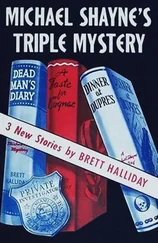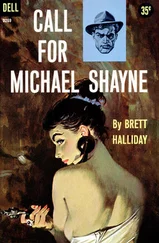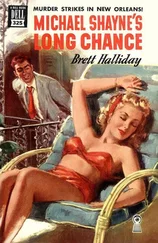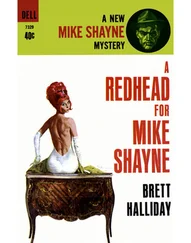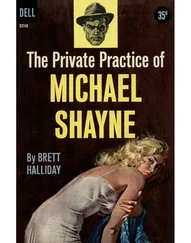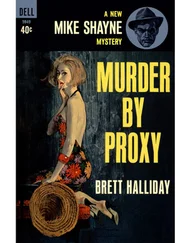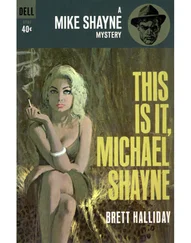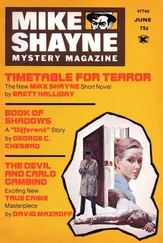Brett Halliday - Mike Shayne's Torrid Twelve
Здесь есть возможность читать онлайн «Brett Halliday - Mike Shayne's Torrid Twelve» весь текст электронной книги совершенно бесплатно (целиком полную версию без сокращений). В некоторых случаях можно слушать аудио, скачать через торрент в формате fb2 и присутствует краткое содержание. Город: New York, Год выпуска: 1961, Издательство: Dell Publishing, Жанр: Детектив, на английском языке. Описание произведения, (предисловие) а так же отзывы посетителей доступны на портале библиотеки ЛибКат.
- Название:Mike Shayne's Torrid Twelve
- Автор:
- Издательство:Dell Publishing
- Жанр:
- Год:1961
- Город:New York
- ISBN:нет данных
- Рейтинг книги:3 / 5. Голосов: 1
-
Избранное:Добавить в избранное
- Отзывы:
-
Ваша оценка:
- 60
- 1
- 2
- 3
- 4
- 5
Mike Shayne's Torrid Twelve: краткое содержание, описание и аннотация
Предлагаем к чтению аннотацию, описание, краткое содержание или предисловие (зависит от того, что написал сам автор книги «Mike Shayne's Torrid Twelve»). Если вы не нашли необходимую информацию о книге — напишите в комментариях, мы постараемся отыскать её.
Mike Shayne's Torrid Twelve — читать онлайн бесплатно полную книгу (весь текст) целиком
Ниже представлен текст книги, разбитый по страницам. Система сохранения места последней прочитанной страницы, позволяет с удобством читать онлайн бесплатно книгу «Mike Shayne's Torrid Twelve», без необходимости каждый раз заново искать на чём Вы остановились. Поставьте закладку, и сможете в любой момент перейти на страницу, на которой закончили чтение.
Интервал:
Закладка:
He was mopping his brow when she returned with the tray. He gulped at the frosty yellow beverage greedily.
“This house,” she said, easing back in her rocker, “has been in my family since eighteen hundred and two. It was built some fifteen years before that. Every member of the family, except my son, Michael, was born in the bedroom upstairs. I was the only rebel,” she added raffishly. “I had new-fangled ideas about hospitals.” Her eyes twinkled.
“I know it’s not the most solid house in Ivy Corners. After I brought Michael home, there was a flood in the basement, and we never seemed to get it dry since. Aaron tells me that there are termites, too, but I’ve never seen the pesky things. I love the old place, though; you understand.”
“Of course,” Waterbury said.
“Michael’s father died when Michael was nine. It was hard times on us then. I did some needlework, and my own father had left me the small annuity which supports me today. Not in very grand style, but I manage. Michael missed his father, perhaps even more than I. He grew up to be — well, wild is the only word that comes to mind.”
The fat man clucked, sympathetically.
“When he graduated from high school, Michael left Ivy Corners and went to the city. Against my wishes, make no mistake. But he was like so many young men; full of ambition, undirected ambition. I don’t know what he did in the city. But he must have been successful — he sent me money regularly.” Her eyes clouded. “I didn’t see him for nine years.”
“Ah,” the man sighed, sadly.
“Yes, it wasn’t easy for me. But it was even worse when Michael came home because, when he did, he was in trouble.”
“Oh?”
“I didn’t know how bad the trouble was. He showed up in the middle of the night, looking thinner and older than I could have believed possible. He had no luggage with him, only a small black suitcase. When I tried to take it from him, he almost struck me. Struck me — his own mother!
“I put him to bed myself, as if he was a little boy again. I could hear him crying out during the night.
“The next day, he told me to leave the house. Just for a few hours — he wanted to do something, he said. He didn’t explain what. But when I returned that evening, I noticed that the little black suitcase was gone.”
The fat man’s eyes widened over the lemonade glass.
“What did it mean?” he asked.
“I didn’t know then. But I found out soon — too terribly soon. That night, a man came to our house. I don’t even know how he got in. I first knew when I heard voices in Michael’s room. I went to the door, and tried to listen, tried to find out what sort of trouble my boy was in. But I heard only shouts and threats, and then…”
She paused, and her shoulders sagged.
“And a shot,” she continued, “a gunshot. When I went into the room, I found the bedroom window open, and the stranger gone. And Michael — he was on the floor. He was dead.”
The chair creaked.
“That was five years ago,” she said. “Five long years. It was a while before I realized what had happened. The police told me the story. Michael and this other man had been involved in a crime, a serious crime. They had stolen many, many thousands of dollars.
“Michael had taken that money, and run off with it, wanting to keep it all for himself. He hid it somewhere in this house — to this very day I don’t know where. Then the other man came looking for my son, came to collect his share. When he found the money gone, he — he killed my boy.”
She looked up. “That’s when I put the house up for sale, at seventy-five thousand dollars. I knew that, someday, my son’s killer would return. Someday, he would want this house at any price. All I had to do was wait until I found the man willing to pay much too much for an old lady’s house.”
She rocked gently.
Waterbury put down the empty glass and licked his lips, his eyes no longer focusing, his head rolling loosely on his shoulders.
“Ugh!” he said. “This lemonade is bitter.”
THREE WIVES TOO MANY
by KENNETH FEARING
1
Richard C. Brown gazed in contented speculation across the breakfast table at the plain but pleasant face of his wife Marion. He was aware not only of her companionable silence, but savored also the cozy perfection of the tiny alcove, in fact, the homey restfulness of the entire bungalow.
For a moment, he almost regretted the need to leave this suburban idyll on the outskirts of Camden, and Marion, in order to reach his home in Newark by nightfall, and to be with Bernice, his fourth and most recent wife, at the usual hour. But he knew that domestic peace, to say nothing of his own safety, depended upon the most rigid adherence to his fixed routine.
Bernice, a natural and vivacious blonde, was much younger and very much prettier than Marion, whose tightly combed hair showed an unmistakable tinge of gray in its otherwise inky darkness. Marion, in fact, was the wife Richard had who was as old as himself. When he married her, he had rather felt he was making a reckless gamble.
But now, after four years — no, come to think of it, five years — he felt she had turned out extraordinarily well. Whereas Bernice, he had to face it, still couldn’t cook, after almost a year of marriage. Her cooking, like her disorderly housekeeping, would probably never improve.
Still, she was lively, and decorative, though by no means as gorgeous as the ripe, still magnificently cream-skinned and red-haired Lucille. Lucille was his first wife, and although nowadays she was showing more and more ill temper, especially when she drank, he was still very fond of her, and they still maintained their original home in Hartford.
He would be seeing her, on schedule, three days hence. After that, came the turn of the dark, brooding, capricious Helen, his second, in a suburb of Boston. Helen was a little extravagant. She always had been. But what were a few faults? They were only to be expected. After all, he probably had a few himself.
So Richard C. Brown speculated, as he often did, weighing the pros and cons of this life he led.
Had he chosen wisely in selecting matrimony as his profession? Richard frowned, faintly, and softened the harsh phraseology of the question. He hadn’t chosen it, exactly. He had drifted into it, beginning as an ardent, even a romantic, amateur. It was so easy to get married that he had not even thought of that vulgar word, bigamy, until some time after he had already committed it.
But after two ceremonies, with a third impending — his match with Marion — yes, by then he had realized he was launched upon a special type of career, one that might have certain risks attached, but one that also, with care and prudence, offered rich rewards.
“Richard? Is that what’s worrying you?”
Richard returned his attention to Marion, suddenly aware that her voice echoed a whole series of remarks he had not quite caught. Richard smiled, genuinely surprised. “Worrying me, dear?”
“For a minute, you were frowning. I thought perhaps your mind was on that offer to buy the house and lot. It was such a big price the broker offered, I could hardly believe it. I thought maybe you regretted turning it down. I wonder if you did it just on my account, even though you thought it was really a mistake to pass up the chance. Was that it, Richard?”
Richard was still more surprised — honestly surprised, and deeply touched. “No, nothing’s worrying me,” he said, in affectionate rebuke. “Least of all, that proposition to sell. I’d forgotten all about it.”
Marion, pouring him a second cup of coffee, pursued the subject to its logical end. “Because, if the offer is still open, and you think we ought to sell, I’ll sign. Our joint title to the deed, I mean. Perhaps you thought I sounded unwilling before. But that was only because I didn’t really understand what a wonderful price we were being offered.”
Читать дальшеИнтервал:
Закладка:
Похожие книги на «Mike Shayne's Torrid Twelve»
Представляем Вашему вниманию похожие книги на «Mike Shayne's Torrid Twelve» списком для выбора. Мы отобрали схожую по названию и смыслу литературу в надежде предоставить читателям больше вариантов отыскать новые, интересные, ещё непрочитанные произведения.
Обсуждение, отзывы о книге «Mike Shayne's Torrid Twelve» и просто собственные мнения читателей. Оставьте ваши комментарии, напишите, что Вы думаете о произведении, его смысле или главных героях. Укажите что конкретно понравилось, а что нет, и почему Вы так считаете.

